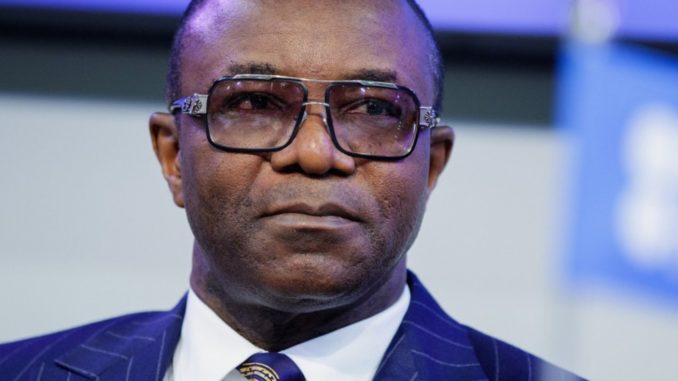
A desperate campaign is on to obfuscate the key issues in the memo from the Minister of State for Petroleum Resources, Ibe Kachikwu, to President Muhammadu Buhari, detailing what he considered as due process breaches in the way the Nigerian National Petroleum Corporation is being run. At work are some elements in the Presidency and vested interest groups. Unfortunately, emphasis has been on what the minister did not say or mean, on the said $25 billion contract, rather than focusing on the crux of his message.
Kachikwu’s August 30 memo harped on corporate governance missteps by the Group Managing Director of the NNPC, Maikanti Baru, in some critical decisions already taken. The NNPC board oversees its affairs but was kept in the dark, Kachikwu lamented.
At issue are the Crude Term, Direct Sale, Direct Purchase; Ajaokuta-Kaduna-Kano Gas Pipeline; Financing allocation funding with the NOCs and the NPDC production service contracts. Also critical are the appointment of executive directors and Baru’s insubordination in ignoring the minister’s letter that sought clarifications on some issues.
But Baru in his reply to Kachikwu’s memo, at the behest of the President, dismissed the allegations against him as baseless. He never acknowledged any role whatsoever for the NNPC board in the approval of contracts, save the Tender’s Board – comprising the GMD and the executive directors – the President in his executive capacity; the Minister of Petroleum Resources and the Federal Executive Council. Yet, Section 1 (2) of the NNPC Act provides that: The affairs of the Corporation shall be conducted by a Board of Directors of the Corporation, which shall consist of a Chairman, the GMD and others. Therefore, the NNPC and the Presidency’s attempt to reduce the Crude Term and DSDP as minor issues – “simply a list of off-takers of crude oil and suppliers of petroleum products of equivalent value” – with terms and conditions, which are not within the purview of the board, does not wash.
In retrospect, a similar swap deal worth $24 billion under the immediate past administration haemorrhaged Nigeria financially. It is currently a subject of an investigation by an ad hoc panel in the House of Representatives. Three past GMDs of the NNPC that appeared before it submitted that Diezani Alison-Madueke, as Minister of Petroleum Resources, “approved” the contract without signing any valid agreement with the crude oil “off-takers.” In its testimony, the Federal Inland Revenue Service said, one of the firms’ – Transfigura – tax payment default to the Federal Government was $642.5 million.
This is the natural corollary of corporate governance made bunkum by acts of omission or commission. An economy like ours, heavily dependent on oil revenues, requires all hands on deck in tidying up a critical transaction of this nature. Call it contract, describe it as agreement with off-takers or whatever name, it is a business engagement too sensitive to be left in the hands of a few, even when the President is involved. The truth is, he does not know it all on all issues requiring his assent. For instance, his approval of the dismissal of the governing councils of 13 federal universities in 2016, underscores this fact. He later apologised publicly, when he realised his mistake.
It is for this reason that the President’s office, whether in the United States, Germany or anywhere in the world, is embroidered with a legion of experts as advisers and ministers to assist the President in discharging the enormous state duties begging for attention. In the case of the NNPC, there is a supervisory board to which Buhari appointed Kachikwu to be its chairman. By so doing, he effectively ceded some powers to him.
However, some concerned Nigerians have blamed Buhari squarely for the Kachikwu-Baru rift, which undoubtedly is rooted in the fact that the President arrogated to himself the position of Minister of Petroleum Resources. An impotent or lame-duck NNPC board, implicit in Kachikwu’s lamentation, creates a solid foundation for mismanagement and financial recklessness. Ultimately, it turns the corporation into a tower of corruption, an odious legacy of the Goodluck Jonathan administration that the government is presently battling with, given the staggering sums of stolen oil revenue being recovered by the Economic and Financial Crimes Commission.
Kachikwu’s allegations are weighty. This was why the Senate set up an ad hoc committee to investigate the matter. Curiously, media reports last week indicated that there were covert designs to pressure the panel to drop its inquest. The panel, chaired by Aliyu Wammako from Sokoto State, should not succumb to this devious prompting, as doing so will not be in the public interest.
Regrettably, the President whom Baru claimed he got his nod to discharge the responsibilities that made nonsense of the existence of the NNPC board, has maintained an absolute silence. This is unacceptable. Kachikwu was, therefore, spot-on when he told him in the memo: “… the correct governance is that the Minister of State and the Board review the transaction and give their concurrence prior to presentation to you.”
Non-adherence to this open and transparent administrative template amid revelations of how the NNPC was ruined in the recent past is not good for his image as a President that preaches due process and corrupt-free governance. The board of the corporation should be allowed to carry out its statutory role. It is not enough for Buhari to merely tell the minister and the NNPC boss to “find ways of working together to remove doubt and rift.” He should act and reverse all indiscretions identified in the Kachikwu memo.
END

Be the first to comment